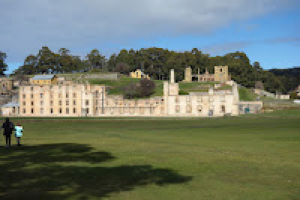Kirkus Reviews, 2018
In this historical novel, Eger (When the Music Stops: Dance On, 2015, etc.) draws on substantial research to tell the story of Ean McClaud, a printer’s apprentice accused of theft in England and quickly deported to Australia, a British penal colony for much of the 19th century.
Eger paints a vivid portrait of the Tasmanian penal colony and does not shy away from graphic descriptions of the violent and cruel techniques used to control the prisoners. The depictions of floggings and beatings, while detailed, are never overly gratuitous.
A well-researched, if limited, tale of life in a Tasmanian penal colony and the horrors of wrongful conviction.
The year is 1850. Accused of a crime he didn’t commit, sixteen-year-old Ean McCloud faces a daunting three-year sentence at Tasmania’s infamous Port Arthur Penal Colony. According to a Google source, some 1100 prisoners died there during the 50 years the notorious penitentiary served as one of the harshest in Australia.
Why do I mention the history of this infamous prison? It’s important to the understanding of Paddy Eger’s incredible novel. Historically, the details of her story are accurate in even the minute details. While the characters are fictitious, the locale is real. The “feel” of the area is real. The brutal treatment of the inmates is real. How did she know? She traveled to Tasmania, walked the Port Arthur grounds, and visited the actual prison. After returning home, she was so touched and inspired by what she had seen that she did extensive research on the area and wrote a poem about her feelings. Realizing that wasn’t enough to convey her experience, she penned a short story. When a friend told her she should write a book, that was all the encouragement she needed to create the engaging novel she called Tasman.

Remember that Ireland’s potato famine began in 1845 and didn’t officially end until 1852. During those years when some 1,000,000 Irish men, women, and children starved to death, between 1,000,000 and 2,000,000 fled the country to avoid the same fate. Despite the desperate circumstances of those who stayed, the English offered very little relief to the poor tenant farmers who relied on potatoes to feed them and their families during the cold winters. Furthermore, years of conflict between the two countries had made those of Irish descent unwelcome residents in England. To say that Ean McCloud was a victim of circumstances is indeed an understatement.
Sent to Tasmania on a prison ship after being found guilty in a London court, he was treated as an adult criminal despite his youth and innocence. Tasman chronicles his time there, the people and situations that threatened to destroy his last thread of hope, the ultimate death sentence, and the surprising support that materialized from an unexpected source.
This is a fabulous story, a powerful page turner that is difficult to put down. I strongly recommend it as a must-read for all lovers of historical fiction—and many others, as well.
A fabulous, powerful page turner
The year is 1850. Accused of a crime he didn’t commit, sixteen-year-old Irish lad, Ean McCloud, faces a daunting three-year sentence at Tasmania’s infamous Port Arthur Penal Colony. According to a Google source, some 1100 prisoners died there during the 50 years the notorious penitentiary served as one of the harshest in Australia.
Why do I mention the history of this infamous prison? It’s important to the understanding of Paddy Eger’s incredible novel. Historically, the details of her story are accurate in even the minute details. While the characters are fictitious, the locale is real. The “feel” of the area is real. The brutal treatment of the inmates is real. How did she know? She traveled to Tasmania, walked the Port Arthur grounds, and visited the actual prison. After returning home, she was so touched and inspired she created the engaging novel she called Tasman.
I strongly recommend Tasman as a must-read for all lovers of historical fiction—and many others, as well.
